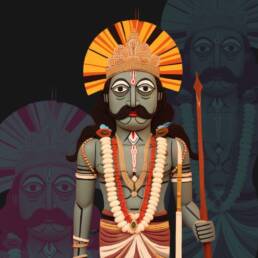In apartheid South Africa in the 1960s, a prisoner smuggled the works of William Shakespeare into a maximum-security prison on Robben Island under the guise of the Bhagavad Gita and called it a Bible which later inspired the likes of Nelson Mandela.
The maximum-security Robben Island prison in South Africa is deeply intertwined with the nation’s history. Built in 1961 6.9 kilometers west of Cape Town’s Bloubergstrand coast, it has housed many political prisoners over the years.
In the early 1970s, the Robben Island prison opened its gates to a man charged with terrorism, Surinarayan Kala Venkatrathnam, also known to friends as Sonny Venkatrathnam.
Born in Natal in Durban, his grandparents had migrated to South Africa from India where they worked as indentured laborers. Family circumstances were difficult, but Sonny was fortunate to receive a good education.
Racism was at its peak and Sonny, like many others, saw it first‐hand. After graduating, he took part in various protest movements and joined organizations such as the Non-European Unity Movement (NEUM), a Trotskyist body founded in South Africa in 1943.
In 1964, Sonny’s life went into disarray as he lost his teaching job due to his involvement in the Unity movement. To make ends meet Sonny had to run a butcher shop in Chatsworth in KwaZulu-Natal.
By the mid-60s, the Unity movement got involved in the armed struggle through one of its affiliates, the African Peoples’ Democratic Union of Southern Africa. Sonny and his comrades started recruiting guerrilla fighters.
The authorities soon learned of Sonny’s involvement; they ransacked his office, and house but found nothing. He was grilled at the station for 24 hours non-stop. Beaten and tortured he didn’t throw his comrades under the bus.
He was soon sent to Pietermaritzburg Prison. While he waited in prison, the Pietermaritzburg Magistrates Court charged him and 14 other associates with four counts under the Terrorism Act. They were sentenced to Robben Island prison.
By then the Maximum-security prison on Robben Island was already home to some of South Africa’s finest men. Walter Sisulu, Govan Mbeki, Mac Maharaj, and Nelson Mandela were all in for their anti-apartheid activism.
Even a badly bruised Sonny was not one to give in easily to hostile situations. While in prison he received a copy of the complete works of William Shakespeare. Although it was confiscated at first, Sonny later managed to camouflage the book using Diwali greeting cards sent by his family.
When questioned by the prison guards and jailers, he told them that it was his religious book Bhagavad Gita, akin to the Bible. The name stuck and the book would forever be known as the Robben Island Bible.
Over the next many years, the Robben Island Bible got passed on to other political prisoners. They made a ritual of leaving their signatures next to passages and phrases that they felt were relevant even after all these years.
A section of the play Julius Caesar was marked by Mandela:
Cowards die many times before their deaths.
The valiant never taste of death but once.
Of all the wonders that I yet have heard,
It seems to me most strange that men should fear,
Seeing that death, a necessary end,
Will come when it will come.
Mandela may have found himself in a similar situation as Caesar. Similar words can be found in Mandela’s autobiography, parts of which were smuggled out of prison by Mac Maharaj.
The prison authorities never got hold of the “Bible”, and Shakespeare’s words continued to serve as inspiration to political prisoners like Mandela until the Robben Island prison was closed for good.
Sonny was released in 1978, but the authorities always kept him under surveillance. He went on to work for Amnesty International and co-produced a rock concert in 1988 called Human Rights Now featuring the likes of Sting and Bruce Springsteen.
Today, on his death anniversary, we remember Sonny as a man who brought a silent revolution not with guns but with the power of words, like a true Shakespearean hero.
Sources:
- Surinarayan ‘Sonny’ Kala Venkatrathnam, https://www.sahistory.org.za/people/surinarayan-sonny-kala-venkatrathnam;
- When Nelson Mandela met Shakespeare: The Robben Island Bible, by Ennio Cretella, https://auralcrave.com/en/2018/06/25/when-nelson-mandela-met-shakespeare-the-robben-island-bible/;
Image Attributes:
- Robben Island Bible, from https://news.hofstra.edu/2016/01/21/robben-island-bible-embodies-timelessness-of-shakespeare-and-resilience-in-the-fight-for-freedom/;
- Sonny Venkatrathnam with his copy of the Complete Works of Shakespeare, Disguised as a Hindu book in the prison on Robben Island. from Shakespeare Birthplace Trust;
- Nelson Mandela and fellow ANC activist Walter Sisulu in prison on Robben Island. Photograph: Bailey’s African History Archive, https://www.theguardian.com/world/2013/dec/07/nelson-mandela-robben-island-anc-prisoner;1976 Soweto Uprising, from https://www.bbc.com/news/world-africa-34656160




